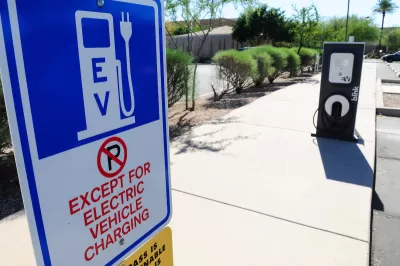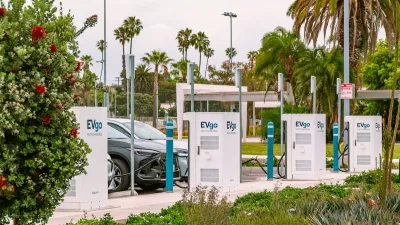A lack of access to charging infrastructure is holding back EV adoption in many US cities.

Writing in PC Mag, Emily Dreibelbis, highlights a paradox: while many electric vehicles are designed for urban environments, “Early adopters are primarily wealthy, single-family homeowners who can power up on private chargers versus those in rental property garages.”
Dreibelbis points out that by 2030, 60 percent of EVs will be in suburbs and “92% of chargers nationwide will be in single-family homes, according to a June 2023 DOE report.” The latter statistic reveals a major reason why urban Americans are less likely to buy electric cars: a lack of charging infrastructure.
[F]or now, EVs are stuck in the suburbs thanks to public charging limitations and a car culture where bigger means better.
The lack of accessible EV chargers in urban areas means urban dwellers can’t benefit from their advantages in the very places they would be most efficient. “When it comes to charging in urban areas, Europe has a few tricks the US hasn't embraced yet, such as converting existing light poles to charging stations. They're BYOC (bring your own cord); drivers pull up and plug in with their own equipment.”
Until urban infrastructure catches up, the suburbs will play a key role in EV adoption, Dreibelbis writes. “They prove that when charging is easy and available, and the driver considers the vehicle affordable, people love EVs.”
FULL STORY: Why Electric Cars Are Built for Cities, But Only Booming in the Suburbs

Alabama: Trump Terminates Settlements for Black Communities Harmed By Raw Sewage
Trump deemed the landmark civil rights agreement “illegal DEI and environmental justice policy.”

Planetizen Federal Action Tracker
A weekly monitor of how Trump’s orders and actions are impacting planners and planning in America.

The 120 Year Old Tiny Home Villages That Sheltered San Francisco’s Earthquake Refugees
More than a century ago, San Francisco mobilized to house thousands of residents displaced by the 1906 earthquake. Could their strategy offer a model for the present?

Ken Jennings Launches Transit Web Series
The Jeopardy champ wants you to ride public transit.

BLM To Rescind Public Lands Rule
The change will downgrade conservation, once again putting federal land at risk for mining and other extractive uses.

Indy Neighborhood Group Builds Temporary Multi-Use Path
Community members, aided in part by funding from the city, repurposed a vehicle lane to create a protected bike and pedestrian path for the summer season.
Urban Design for Planners 1: Software Tools
This six-course series explores essential urban design concepts using open source software and equips planners with the tools they need to participate fully in the urban design process.
Planning for Universal Design
Learn the tools for implementing Universal Design in planning regulations.
Clanton & Associates, Inc.
Jessamine County Fiscal Court
Institute for Housing and Urban Development Studies (IHS)
City of Grandview
Harvard GSD Executive Education
Toledo-Lucas County Plan Commissions
Salt Lake City
NYU Wagner Graduate School of Public Service





























